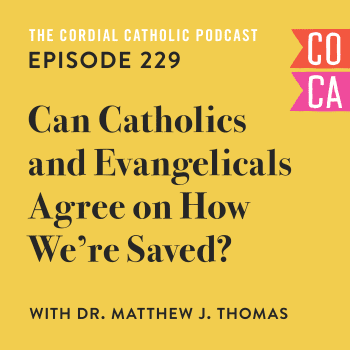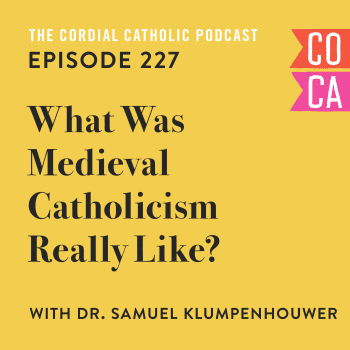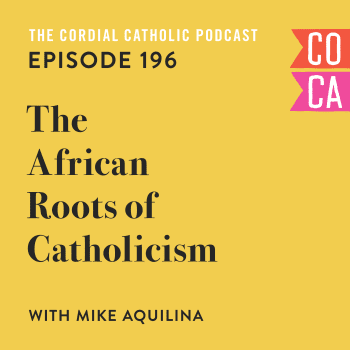
As a younger Evangelical I would’ve marched, proudly, in the Parade to End Religion. If such a thing existed.
To me, and to many of my Pentecostal brethren, religion equated to a musty old out-dated mantra—the empty piety of a dank old cathedral. The broken beads of a tangled-up rosary, something found stuffed in a bureau drawer.
In fact, when I first read Scott Hahn’s Rome Sweet Home his terse attitude towards religion, and Catholicism in particular, was deeply resonate. Hahn, who found and destroyed his grandmother’s rosary, after her death, because it was too religious, only to become, himself, one of our century’s most famous converts.
I, like Hahn, mistakenly side-stepped religion as something inherently bad. Worse, Protestant Christians like Hahn and myself went a step further: We condemned religion.
I’ve since changed my mind.
But I do still grimace, in passing, when I hear blanket condemnations of religion—in phrases like, “let’s end religion.”
Because, no, religion is not bad. And the folks that will tell you otherwise are, flatly, dead wrong.
No, Jesus Didn’t Condemn Religion.
The main fuel which fed the fire of us religious-opposed was what we perceived as Jesus’ wholesale condemnation of religion.
It was clear, to us, that the Jesus of the New Testament time and time again put the Pharisees, the Jewish religious leaders of Jesus’ time, squarely in their place.
If Jesus condemned religion, we thought, then so should we.
But such a line of thinking was based on a complete misreading of Jesus’ numerous interactions with the religious leaders of his time.
As I’ve written before, a much better reading of Jesus’ interactions, one more squarely based in historical context, is that Jesus condemned their naked piety. Their false religion.
See, the Pharisees tried hard, and earnestly, to keep God’s commandments and do what was right and they weren’t, and shouldn’t, be condemned for such earnestness. They were condemned because their religiousness didn’t extend to their hearts.
Speaking about the Pharisees, Pope Francis, a model of Jesus’ mission on earth, said,
They were strong, but on the outside. They were in a cast. The heart was very week, they didn’t know what they believed. And because of this their life, the outer part of their life, was completely regulated, but the heart was otherwise: a weak heart, and a skin that was plastered over, strong, harsh. Jesus, on the other hand, teaches us that the Christian should have a strong heart, a firm heart, a heart built on the rock, that is Christ; and then, in the way it goes out, it goes out with prudence.
Jesus didn’t come to condemn religion, he came to condemn false religion.
I can’t underscore how important that is to understand everything that follows.
Yes, Jesus Founded a Religion.
Jesus came to establish a relationship with humankind, not a religion.
This, or something like this, was the mantra of many of the emergent authors I devoured in my university days as a budding theologian.
Jesus had no interest in establishing a people who practiced religion and ritual he merely wanted to get to know us, for us to know Him, and for us to find salvation in His sacrifice.
And while relationship ought to be, certainly, the cornerstone of any religious Christian expression, it is an argument that is inherently flawed.
Because Jesus did found a religion.
In the institution of Baptism and the Lord’s Supper, Jesus established new rituals very much like the religious Jewish rituals of His time. In the Sermon on the Mount and the Eucharistic Discourse He promulgated new norms very much like the religious regulations of the Jews.
And in the years immediately following His death and resurrection and in the beginning of the spread of Jesus’ message, a distinctly religious framework begins to emerge.
We see this in the Acts of the Apostles, in the letters of Peter and Paul, and in incredibly preserved documents like the first-century Didache which outlines in minute detail exactly how certain religious rituals like Baptism and Communion should be performed.
To stubbornly ignore the clearly religious implications of the first and second century Christian community is to do oneself a great disservice.
Christianity was a ‘Religion’ for 1,500 Years
But even if Jesus didn’t establish a religion, if even his most immediate apostles like Peter and Paul got it wholly wrong, then what emerged over the course of the next 1,500 years warrants some kind of explanation.
Because for 1,500 years of Christianity its expression was decidedly religious.
This begs the question: If religion is “bad” then what do we make of Christians for 1,500 years?
This profound argument is the same made by St. Francis de Sales writing to Luther, Calvin, and the other Reformers at the height of the Protestant Reformation.
If Christianity wasn’t meant to be a ‘religion’ then Christianity for 1,500 years went wrong.
And the Protestant Reformers rediscovered it?
Yet even while these Reformers objected to some of the teachings of the modern religious leadership none argued for Christianity as a mere relationship.
It seems preposterous, at best, to argue that religion is bad when Christianity existed as something very much religious for 1,500 years.
A condemnation of religion, in that case, is a wholesale condemnation of Christians for the first millennium and a half.
Does it really make sense to argue that Jesus began a movement on the backs of his apostles only to have them lose the plot almost immediately? A plot that wouldn’t be picked up again until the 16th century?
Recognize that Condemnation of Religion Occurs in a Bubble
In any case, condemnation of ‘religion’ as bad is a fundamentally dangerous game to play. Namely, in the face of billions (with a ‘b’) of Christians worldwide who subscribe to what would be considered a ‘religious’ expression of their faith.
Catholics, Orthodox, and high church Anglicans would not only be incredibly offended but would baulk at the notion that there’s something wrong with their expression of faith.
That Jesus wants an end to the religion in which they find great solace, and power and enjoy a decidedly personal relationship with Him.
Those that condemn bad religion do so in an enormous bubble—a with a fundamentally narrow worldview.
If religion is bad then why is Catholicism the fastest growing religion in Africa? Why is it such a profound force in Latin America? Why is it doing so much tangible good in the world?
It’s an incredibly North American-centric point of view that says we should do away with religion, that religion is bad, and that we’re better off focusing merely on a relationship.
As if the North American, puritan experience of relationships is the only way these sorts of things can be expressed. As if, in other cultures around the world, relationships (like love, for example) don’t have ritual expressions.
Recognize that Condemnation of Religion is Divisive
Following this, it’s safe to say that condemnation of religion is fundamentally divisive.
Rather than focusing on the relationship with Christ that Catholics, Orthodox, and Anglicans have and emphasizing how these genuine believers can better their faith walk, an argument which simply asserts that religion must end creates divisions in the Body of Christ rather than building it up.
To what end?
Are the untold billions of religious believers practising the true Christian faith wrong? Are their souls in peril? And are a handful of Protestant theologians going to save them?
It seems short-sighted, narrow-minded, and fundamentally flawed to try and divide the Body of Christ in order to unite it under a new banner. To stamp out religion in order to lead us all to a better relationship with Christ.
Certainly, one could successfully argue that religious ritual can crowd out a genuine relationship with Christ but, likewise, someone else could easily argue the same for boiling down our understanding of Christ to merely a relationship.
Especially in our modern day North American understanding of relationship.
From My Own Experience…
Finally, there’s this: my own experience.
Take it with a grain of salt.
But as I began my journey towards Catholicism I experienced a number of profound and powerful paradigm shifts. I went from believing that religion is bad to understanding the beauty and strength that can be derived therein.
And once I understood what a religion like Catholicism had to offer, I was absolutely taken.
For me, becoming a Catholic hasn’t—as some would argue—gotten in the way of my relationship with Christ but, rather, profoundly deepened it in ways which I could’ve never imagined.
Not in a million years.
I’ve come to understand and appreciate beautiful and profoundly religious rituals and experiences and I’ve come to see how those only serve to draw me closer into Christ. Fully “Catholic things” like the Rosary, Eucharistic Adoration, the Divine Office, Novenas, and the beauty of the Liturgy.
Heck, even the use of incense in a worship service has brought me to tears.
These “religious” things which I would’ve once dismissed as getting in the way of Christ all point, profoundly, to Christ Himself.
It only took me understanding them.
So, no, in my experience and, in my opinion, in the history of Christianity it’s wrong to say that religion is bad.
You’re wrong.
Because it’s not.
For me, for billions of other Christians around the world, and for Christians throughout most of the history of Christianity, religion has drawn us ever closer into relationship with Christ. And it will continue to do so, God willing, until He comes again.












